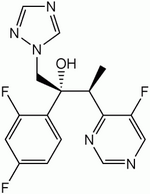VFEND
A new antifungal drug, Wend (voriconazole), has been approved by the FDA for life-threatening systemic fungal infections. Available in both IN. and oral forms, the drug is indicated for primary treatment of acute invasive aspergillosis and as salvage therapy for rare but serious fungal infections caused by the pathogens Scedosporium apiospermum and Fusarium species that have resisted other therapies. Amphotericin B is currently the standard treatment for systemic fungal infections.
In a large clinical trial, Wend proved more effective than amphotericin B as primary treatment for invasive aspergillosis. Fifty-three percent of patients who received Wend had responded at 12 weeks of treatment, versus 32% of those who received amphotericin B. The survival rate for Wend-treated patients was 71%, compared with 58% of those in the amphotericin B arm of the study.
Unlike amphotericin B, Wend is generally well tolerated. The most common adverse reactions reported among patients during clinical trials were visual disturbances, elevations of liver function tests, and skin rash. For most patients, these were mild to moderate in severity and usually didn't result in discontinuation of treatment. The option of oral administration permits flexibility in patient care, including step-down therapy during recovery.
Wend is a product of Pfizer, Inc.
Copyright Springhouse Corporation Sep 2002
Provided by ProQuest Information and Learning Company. All rights Reserved



